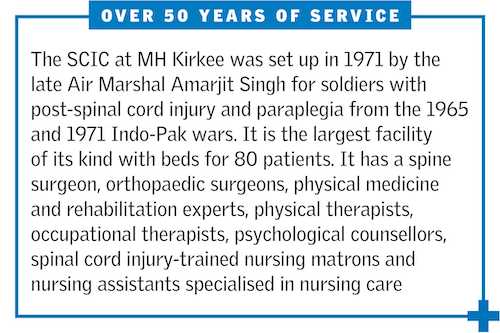Spinal Cord Injury Centre, Kirkee
This is a collection of articles archived for the excellence of their content. |
As in 2023
Sandip Dighe, January 22, 2023: The Times of India

From: Sandip Dighe, January 22, 2023: The Times of India

From: Sandip Dighe, January 22, 2023: The Times of India

From: Sandip Dighe, January 22, 2023: The Times of India
Jammu and Kashmir. He suffered severe impact trauma to his spine – a career killer – and had to be operated upon at Command Hospital, Udhampur. But when full recovery seemed elusive he was sent to Spinal Cord Injury Centre (SCIC) at the military hospital in Kirkee, Pune. A few months later he was back on his feet.
“This time last year, I wasn’t so sure. Now I am looking forward to wearing my uniform again,” the 37-year-old told TOI.
The paratrooper was in a walker when he arrived at the SCIC last November. Patients with such injuries take at least 2-3 years to recover, but he was able to run without support within months.
The doctors are quietly impressed, but don’t make a big deal out of it. “Timely evacuation, early treatment, aggressive and protocol-based rehabilitation and strong willpower – all these factors worked in sync to help the soldier recover,” spine surgeon and medical officer-in-charge of the centre, Lt Col Vyom Sharma, said.
He checks in on all his patients at the centre every day. Seventy-six patients, including officers, are in various stages of recovery. Many will need intense therapy and it’s here that SCIC’s unparalleled expertise and support come in.
Bouncing Back
The centre employs a complex retraining system called ‘activities of daily living (ADL)’ which enables spinal trauma patients to return to their routines.
The system is all about regaining confidence from small achievements. When they arrive, patients are unable to move or lift their hands, but after training on specially developed tools their muscles strengthen and they start going about their day more comfortably.
Samir Ranjan, an occupational therapist associated with the ADL programme for over two decades, said their goal is to give patients the confidence to relearn simple tasks like feeding themselves, grooming and putting on a shirt – everything they were unable to do in the early stages of recovery. In ADL sessions patients and therapists work together for hours every day. There’s no giving up, not until the meal is finished and all the buttons done up.
Glory In Sports
Even soldiers who may never fully regain the use of their arms or legs can hope to take up parasport after treatment. They are trained in the Army’s paralympic node in the Bombay Engineering Group and Centre in Kirkee. Some of the tetraplegics and paraplegics have won medals at national and international competitions.
Lt Col Sahil Gautam from the Armoured Corps was in a road accident in 2013 during a posting in Roorkee, Uttarakhand. He had been bedridden for months when he arrived at SCIC. “It took me a couple of years to accept reality. I would spend days being sad. Then I met Col Gaurav Dutta, a para triathlete who encouraged me to take up sports,” he said.
Gautam picked up archery and practised for hours at the sports facilities in Pune. He represented the services team at national and international archery competitions. “I won medals. I found my best during the toughest part of my life because of the doctors, nurses and trainers at SCIC,” he said.
Swimming To Victory
Wing Commander Shantanu was on ventilator support for two months after a motorcycle accident in 2017. His spine was badly damaged. Shantanu was given aqua therapy at Paraplegic Rehabilitation Centre in Kirkee and Bombay Engineer Group and Centre.
It went so well he took up competitive swimming and the next June he won two golds at the Maharashtra state-level swimming championship organised by the state’s Paralympic Swimming Association. He also participated in rowing competitions with some of the best at College of Military Engineering in Pune.
“Sport is important for those recovering here. These stories generate another level of energy for the newly admitted. They know immediately that all’s not over for them,” Lt Col SM Adil, head of the department of orthopaedics, said.
Winning Medals Abroad
Two paraplegic soldiers won medals in the International Wheelchair and Amputee Sports World Games in Portugal last November. Havildar Gopal Singh, a Sena Medal awardee from the parachute regiment, struck gold in javelin and won a bronze in shot put. Gopal said he regained confidence when he took to sports and it changed his outlook. Singh’s teammate Lance Naik Abhijit Patil from the Regiment of Artillery also won a bronze medal in the shot put competition. Both trained at BEG’s paralympic node.
Willpower Is Key
The SCIC is upgrading its infrastructure. There will be a robotic gait trainer for accelerated rehabilitation. “A computerised stairs trainer will be up soon,” SCIC commandant Brigadier Tony Jose said. Beyond machines, personnel here are devising new ways to push willpower. “It is key for recovering from such injuries. They cannot give up,” Ranjan said.